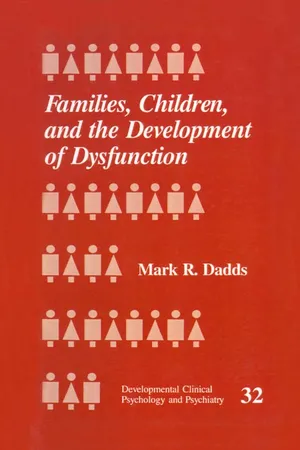
- 125 pages
- English
- PDF
- Available on iOS & Android
eBook - PDF
Families, Children and the Development of Dysfunction
About this book
This unique volume takes a comprehensive approach to child and family mental health by examining the many ways in which family plays a central role in the health and/or dysfunction of the child. Rich in its coverage, this book begins with a presentation of the historical underpinnings of the study of the family?s relation to child development and dysfunction. It details issues related to identification, assessment, and treatment of child dysfunction in relation to family processes and offers alternative conceptual views of the family, and critical features of family life and how they operate. Specific types of dysfunction, such as depression, conduct problems, and anxiety, are presented to convey the ways in which family influences can operate. "I can strongly recommend this book as a good general introduction to thinking about the development of child mental health and how this might relate to the context of family. It would be a handy text for trainees, since it fits easily into a large pocket or small briefcase. --ACPP Review and Newsletter "This is a useful and enjoyable book which provides a clear and thoughtful grounding in the field for the novice and a selection of more ?cutting-edge? material for the specialist." --Frances Gardner in British Journal
Frequently asked questions
Yes, you can cancel anytime from the Subscription tab in your account settings on the Perlego website. Your subscription will stay active until the end of your current billing period. Learn how to cancel your subscription.
At the moment all of our mobile-responsive ePub books are available to download via the app. Most of our PDFs are also available to download and we're working on making the final remaining ones downloadable now. Learn more here.
Perlego offers two plans: Essential and Complete
- Essential is ideal for learners and professionals who enjoy exploring a wide range of subjects. Access the Essential Library with 800,000+ trusted titles and best-sellers across business, personal growth, and the humanities. Includes unlimited reading time and Standard Read Aloud voice.
- Complete: Perfect for advanced learners and researchers needing full, unrestricted access. Unlock 1.4M+ books across hundreds of subjects, including academic and specialized titles. The Complete Plan also includes advanced features like Premium Read Aloud and Research Assistant.
We are an online textbook subscription service, where you can get access to an entire online library for less than the price of a single book per month. With over 1 million books across 1000+ topics, we’ve got you covered! Learn more here.
Look out for the read-aloud symbol on your next book to see if you can listen to it. The read-aloud tool reads text aloud for you, highlighting the text as it is being read. You can pause it, speed it up and slow it down. Learn more here.
Yes! You can use the Perlego app on both iOS or Android devices to read anytime, anywhere — even offline. Perfect for commutes or when you’re on the go.
Please note we cannot support devices running on iOS 13 and Android 7 or earlier. Learn more about using the app.
Please note we cannot support devices running on iOS 13 and Android 7 or earlier. Learn more about using the app.
Yes, you can access Families, Children and the Development of Dysfunction by Mark R. Dadds in PDF and/or ePUB format, as well as other popular books in Psicologia & Psicoterapia. We have over one million books available in our catalogue for you to explore.
Information
Table of contents
- Cover
- Contents
- Series Editor's Introduction
- Preface
- Chapter 1 - Introduction
- Chapter 2 - The Family and Psychopathology: An Historical Overview
- Chapter 3 - Current Issues in the Psychopathology of Childhood
- Chapter 4 - Mechanisms of the Development of Dysfunction
- Chapter 5 - Measurement of the Child and Family
- Chapter 6 - Research Designs with Families and Children
- Chapter 7 - Specific Research Findings
- Chapter 8 - Family Therapy
- Chapter 9 - Conclusions and Future Directions
- References
- Index
- About the Author